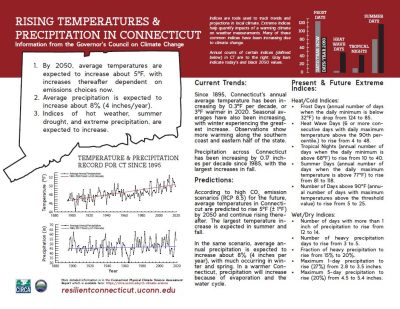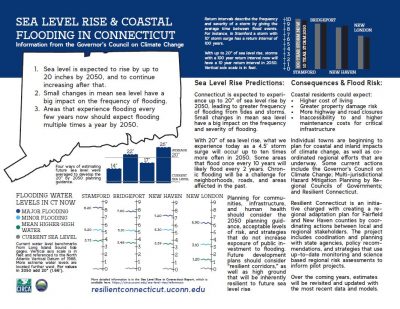Planning for adaptation requires local information about expected changes in climate. Until recently, the spatial scale of climate projections did not allow for detailed regional analysis. With support from CT DEEP, CIRCA sponsored two recent state-level climate assessments to better inform local decision-making and are a new addition to the Institute’s climate planning tools. Don’t have time to read the full reports or want to have information in a one-page fact sheet for handouts? These two products can help you find results quickly:
 |
 |
CIRCA Temperature and Precipitation Fact Sheet
In 2019 a team of UConn researchers reviewed the current state of knowledge of the physical science for observed and projected climate trends and extremes in Connecticut. The result is a report, Connecticut Physical Climate Science Assessment Report that provides a state-level assessment for temperature and precipitation. Study results highlighted in this fact sheet include:
- By 2050, average temperatures are expected to increase about 5 degrees, with increases thereafter dependent on emissions choices now.
- Average precipitation is expected to increase about 8% or 4 inches/year.
- Indices of hot weather, summer drought, and extreme precipitation, are expected to increase.
CIRCA Sea Level Rise Fact Sheet
A second fact sheet expands on CIRCA’s 2019 Sea Level Rise in Connecticut Final Report with flood frequency and storm surge information. Those in touch with Connecticut’s climate news have likely heard CIRCA’s recommendation that Connecticut plan for up to 20 inches (50cm) of sea level rise by 2050 and that levels will likely continue to rise after that date without further mitigation. These study results along with with new text and figures are highlighted including:
- Small changes in mean sea level have a big impact on the frequency of flooding.
- Areas that experience flooding every few years now should expect flooding multiple times a year by 2050.
CIRCA is working with the Governor’s Council on Climate Change (also known as the GC3) and through our membership on the Science and Technology Working Group to include the latest science from these two studies into state climate policy decisions. Originally established in 2015, Governor Ned Lamont issued Executive Order No. 3 on September 3, 2019 to re-establish and expand the GC3 membership and responsibilities. More information on the GC3 and its recent series of public forums can be found here.